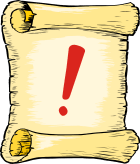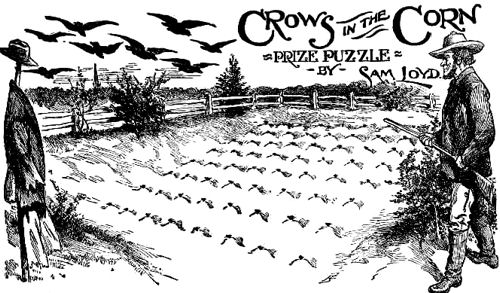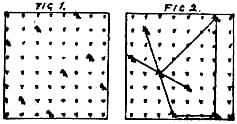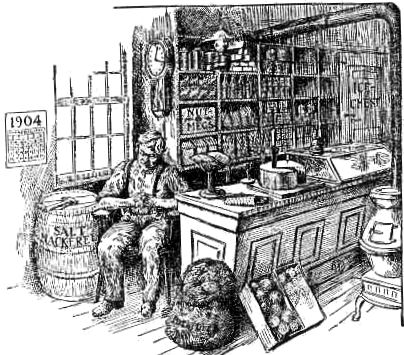



A NOTED ORNITHOLOGIST, describing the habits and sagacity of birds, tells how he witnessed a flock of marauding crows descend upon a corn field and dispose of themselves according to established military tactics. Each bird was posted like an army picket, so as to keep an unobstructed view of every one of his companions, and by his motions apparently maintain a noiseless code of signals which kept the entire flock informed of any approaching danger.
Without attempting to investigate the mysteries, of crow wireless telegraphy, occasion is taken to show that the statement of the distinguished ornithologist suggests a very pretty problem in the science of picket posting.
Take sixty-four points like the centers of the squares of an 8x8 checkerboard, as represented by the hills of sprouting corn in the picture, and the puzzle is to place eight crows on such points that there are no two crows on the same row or diagonal; and so that the man with the gun going around the field would find it impossible to get a shot at three birds in a row. The puzzle is closely allied to my well-known problem of placing eight queens on a chess board so that none is attacked by another, but is an improvement upon the same in that there is but one way of performing the feat, while to the other there are twelve different answers, which by turning the board might be increased to 96 transpositions.
The accompanying diagram shows the correct way of picketing the cornfield with eight crows so that every bird has an unobstructed view of all the others, and so that there are no two birds in the same row or diagonal. It being also impossible for the hunter to discover any standpoint from which he might get a line-shot on three birds.
The second diagram shows one of the many answers submitted by our chess experts who attempted to prove that the puzzle is similar to the famous problem of placing eight queens on a chess-board so that no one attacks another. Chess players, however, know more about rooks than crows, as the hunter readily discovers that two of the shots illustrated would wing three birds, while in the first diagram no such feat is possible if the exact center of the points are calculated upon.

2. The Secret-of-Success Puzzle.
A country grocer, who was always complaining about his lack of success, fell asleep one day in his store, and dreamed that his goods were discussing the secret of success. “No one should do business on tick,” said the clock. “One wants push,” said the button. “And never should be led,” said the pencil. “Take pains,” said the window. All of the articles in the store had something to say, and their remarks were so good that it becomes a puzzle worth propounding, to see if our friends cannot suggest a score or more bright things which the other articles might have said.

“Don't do business on tick,” said the clock. “You lack push,” said the button, “Don’t be led,” said the pencil. “Take pains,” said the window. “Whoop your business and never lose your head,” said the barrel. “Don’t do a light business,” said the lamp. “Look alive and be sharp not mild,” said the cheese. “Keep your eyes peeled,” said the potatoes. “Have plenty of sand,” said the sugar. “Don’t get blue,” said the indigo. “Never cut price nor lose your temper; be sharp,” said the knife. “When you see a good thing stick to it,” said the flypaper. “Keep cool,” said the refrigerator. “Never get stuck on yourself,” added the tack. “Keep your hands busy and never sell on time,” suggested the clock. ”Yes, C. O. D. is the best,” said the salt fish. beware of the beats,” remarked the vegetables. ‘'Yes, look out for the skins,” said the banana, “for as the mucilage says, ‘It’s bad business to get stuck. ’” “Prices should not be too steep,” remarked the Oolong, “for honest tea is the best policy.” “Yes, make your prices draw,” said the stove; “give every one a warm reception, and always honor your draughts.” “Bills should be met,” said the chicken. “And should be promptly reseated,” added an old chair. “Meat your customers with a smile,” said the corn-beef. “Try to soot everybody,” suggested the stovepipe.“ “It is your winning weighs that have the most weight,” said the scales. “But don’t get caught,” added a saucy little sardine. “No, you mustn't lye,” said the potash. “Yes, do write,” interposed the pen. Polished manners are very effective.” said the blacking. “It shows you are well bred,” remarked the flour. “Give your patrons no grounds for complaint,” remarked the coffee. “Keep in the swim,“suggested the smoked herring.” “Give greater bargains every day,” said the nutmeg. “That’s a great idea,” remarked the stove, “but don’t have too many irons in the fire.” “Nor count your chickens before they are hatched, for it’s too bad to be beaten,” said a fresh egg. “Rise early and work,” suggested the yeast. “Yes, the sooner you are out of bed the better,” remarked the asparagus. “Loafing makes you stale,” said the bread. “It gives you a seedy look,” suggested the orange. “Raising the dough is more important, as you may need it,” said the baking-powder. “Look after the scents, the dollars take care of themselves,” remarked the limburger. “That’s right, look after the little leeks,” said the onions. “Be up to date,” suggested the calendar. “It is best to reflect seriously,” said the looking-glass, “for as the cement says, ‘It is never too late to mend.’” “Well, well,” said the ink, “if you want to suck seed you only waste thyme on a navel orange.” At this all the articles laughed, and the grocer awoke, an astonished Budweiser man.
[Page 110]